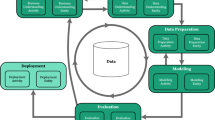Abstract
In recent years, the concept of crowdsourcing becomes more popular and on demand due to the capability of solving many real-world problems in less time. The crowd-sourcing has several ben- efits such as increased speed, flexibility and efficiency in terms of collecting and processing the data. One of the major demands in this crowdsourcing is to find the truthfulness of the obtained data and to ascertain trustworthiness of the sources. Several existing approaches are used for truth discovery among crowd-sourced-based applications. But they work efficiently only for structured data and the accuracy levels are dependent on the availability of ground truth values. To over- come the above-mentioned issues a novel truth discovery model is proposed. In this work it uses knowledge extraction and truth discovery phases to process the data. Reliability scores are assigned to trustworthy users based on the frequency with which they provide true values over a period of time. It works on both categorical and continues data. So, finally the proposed model is tested on three real-valued data sets. Experimental results prove to provide better performance than the conventional approaches.










Similar content being viewed by others
Data availability
Enquiries about data availability should be directed to the authors.
References
Berti-Equille L (2015) Data veracity estimation with ensembling truth discovery methods, in: and others (Ed.) In: 2015 IEEE international conference on big data (Big Data), pp 2628–2636
Chu CH, Chang WC, Lin YI (2020) An exploratory study on computer-aided affective product design based on crowdsourcing. J Ambient Intell Human Comput 11:1–13
Galland A, Abiteboul S, Marian A, Senellart P (2010) Corroborating information from disagreeing views, WSDM. pp 131–140
Jiang L, Niu X, Xu J, Yang D, Xu L (2019) Incentivizing the workers for truth discovery in crowdsourcing with copiers. In: 2019 IEEE 39th international conference on distributed computing systems (ICDCS) 2019 pp 1286–1295
Kaliyar RK, Goswami A, Narang P (2021) FakeBERT: Fake news detection in social media with a BERT-based deep learning approach. Multimed Tools Appl 80:11765–11788. https://doi.org/10.1007/s11042-020-10183-2
Kleinberg JM (1999) Authoritative sources in a hyperlinked environment. J ACM 46(5):604–632
Lee S, Park S, Park S. (2014) A quality enhancement of crowdsourcing based on quality evaluation and user-level task assignment framework. In: 2014 International conference on big data and smart computing (BIGCOMP) pp 60–65)
Li X, Dong XL, Lyons K, Meng W, Srivastava D (2012) Truth finding on the deep web: is the problem solved? Proc VLDB Endowment 6(2):97–108. https://doi.org/10.14778/2535568.2448943
Li T, Gu Y, Zhou X, Ma Q, Yu G (2017) An effective and efficient truth discovery framework over data streams, EDBT pp 180–191
Lofi C, Balke WT (2015) Large Scale Cooperation Scenarios-Crowdsourcing and its Societal Implication, The IPSI BgD Transactions on Internet Research, 3–3
Ouyang RW, Kaplan LM, Toniolo A, Srivastava M, Norman TJ (2016) Parallel and streaming truth discovery in large-scale quantitative crowdsourcing. IEEE Trans Parallel Distrib Syst 27(10):2984–2997. https://doi.org/10.1109/tpds.2016.2515092
Pasternack J, Roth D, (2010) Knowing what to believe (when you already know something), In: International Conference on Computational Linguistics (COLING)
Pasternack J, Roth D, (2013) Latent credibility analysis, in: Proceedings of the 22nd international conference on World Wide Web, pp 1009–1020
Poongodi M, Bose S (2015) Detection and prevention system towards the truth of convergence on decision using aumann agreement theorem. Procedia Computer Science 50:244–251. https://doi.org/10.1016/j.procs.2015.04.053
Rajpurkar P, Zhang J, Lopyrev K, Liang P (2016) Squad: 100,000+ questions for machine comprehension of text, arXiv preprint arXiv:1606.05250
Sharma S (2022) Fact-finding knowledge-aware search engine. In: Sharma N, Chakrabarti A, Balas VE, Bruckstein AM (eds) Data management, analytics and innovation: proceedings of ICDMAI 2021. Springer Singapore, Singapore. https://doi.org/10.1007/978-981-16-2937-2_17
Thiyagaraj MPB, Aloysius A (2017) A survey on truth discovery methods for big data. Int J Comput Intell Res 13:1799–1810
Van Der Putten P, Kok J, Gupta A, (2002) Data fusion through statistical matching
Wan C, Phoha VV, Huang D (2018) TR-MCN: light weight task recommendation for mobile crowdsourcing networks. J Ambient Intell Humaniz Comput 9(4):1027–1038. https://doi.org/10.1007/s12652-017-0505-5
Yin X, Jiawei Han P (2008) Truth discovery with multiple conflicting information providers on the web. IEEE Trans Knowl Data Eng 20(6):796–808. https://doi.org/10.1109/TKDE.2007.190745
Zhao B, Rubinstein BIP, Gemmell J, Han J (2012) A bayesian approach to discovering truth from conflicting sources for data integration. Proc VLDB Endow 5(6):550–561. https://doi.org/10.14778/2168651.2168656
Zhi S, Yang F, Zhu Z, Li Q, Wang Z, Han J (2018) Dynamic Truth Discovery on Numerical Data
Funding
The authors have not disclosed any funding.
Author information
Authors and Affiliations
Corresponding author
Ethics declarations
Conflict of interest
The authors have not disclosed any competing interests.
Additional information
Communicated by Meng Joo.
Publisher's Note
Springer Nature remains neutral with regard to jurisdictional claims in published maps and institutional affiliations.
Rights and permissions
About this article
Cite this article
Vadavalli, A., Subhashini, R. A novel truth prediction algorithm for ascertaining the truthfulness of the data and reliability of the users in crowdsourcing application. Soft Comput 27, 1685–1698 (2023). https://doi.org/10.1007/s00500-022-07095-8
Accepted:
Published:
Issue Date:
DOI: https://doi.org/10.1007/s00500-022-07095-8




